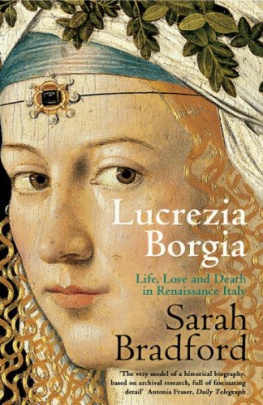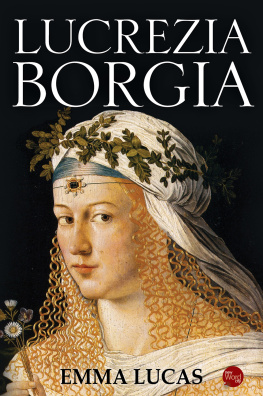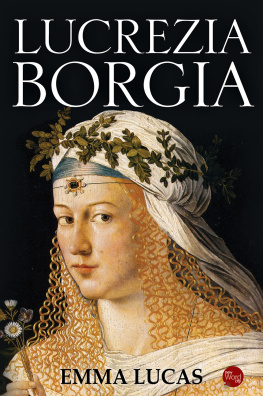Harcourt, Inc.
Orlando Austin New York San Diego London
Copyright 2008 by Christopher Hibbert and Mary Hollingsworth
All rights reserved. No part of this publication may be reproduced
or transmitted in any form or by any means, electronic or mechanical,
including photocopy, recording, or any information storage and retrieval
system, without permission in writing from the publisher.
Requests for permission to make copies of any part of
the work should be submitted online at www.harcourt.com/contact
or mailed to the following address: Permissions Department,
Houghton Mifflin Harcourt Publishing Company,
6277 Sea Harbor Drive, Orlando, Florida 32887-6777.
www.HarcourtBooks.com
Library of Congress Cataloging-in-Publication Data
Hibbert, Christopher, 1924
The Borgias and their enemies: 14311519/Christopher Hibbert.1st ed.
p. cm.
Includes bibliographical references and index.
1. Borgia family. 2. ItalyHistory15th century. 3. ItalyHistory
14921559. 4. NobilityItalyBiography. I. Title.
DG463.8.B7H53 2008
945'.050922dc22 2008003076
ISBN 978-0-15-101033-2
Text set in Requiem Text
Designed by Lydia D'moch
Printed in the United States of America
First edition
A C E G I K J H F D B
Contents
C HAPTER 1 The Crumbling City
C HAPTER 2 Elections and Celebrations
C HAPTER 3 A Man of Endless Virility
C HAPTER 4 Servant of the Servant of God
C HAPTER 5 Marriages and Alliances
C HAPTER 6 The French in Rome
C HAPTER 7 The Conquest of Naples
C HAPTER 8 The Borgia Bull
C HAPTER 9 Father and Children
C HAPTER 10 The Dominican Friar
C HAPTER 11 Murder
C HAPTER 12 Another Husband for Lucrezia
C HAPTER 13 The Unwanted Cardinal's Hat
C HAPTER 14 Cesare's French Bride
C HAPTER 15 Conquests
C HAPTER 16 Jubilee
C HAPTER 17 Duke of the Romagna
C HAPTER 18 The Naples Campaign
C HAPTER 19 The Duke and the Borgia Girl
C HAPTER 20 Frolics and Festivities
C HAPTER 22 Castles and Condottieri
C HAPTER 23 The Death of the Pope
C HAPTER 24 Conclaves
C HAPTER 25 Cesare at Bay
C HAPTER 26 Duchess of Ferrara
C HAPTER 27 The End of the Affair
C HAPTER 28 The Death of the Duchess
C HAPTER 29 Saints and Sinners
Bibliography
Index
Chapter 1
The Crumbling City
"O H G OD, HOW PITIABLE IS R OME "
"Y OU MUST HAVE heard of this city from others," wrote a visitor to Rome in the middle of the fifteenth century.
There are many splendid palaces, houses, tombs and temples here, and infinite numbers of other edifices, but they are all in ruins. There is much porphyry and marble from ancient buildings but every day these marbles are destroyed in a scandalous fashion by being burned to make lime. And what is modern is poor stuff.... The men of today, who call themselves Romans, are very different in bearing and conduct from the ancient inhabitants.... They all look like cowherds.
Other visitors wrote of moss-covered statues, of defaced and indecipherable inscriptions, of "parts within the walls that look like thick woods or caves where forest animals were wont to breed, of deer and hares being caught in the streets ... of the daily sight of heads and limbs of men who had been executed and quartered being nailed to doors, placed in cages or impaled on spears."
This was the state of the city that had once been the capital of a mighty empire; now two-thirds of the area inside the walls, which had been built to protect a population of 800,000, was uninhabited, acres of open countryside used for orchards, pasture, and vineyards, and dotted with ancient ruins, which provided safe hiding places for thieves and bandits. And this was the state of the true home of the pope, the leader of the church who could trace his predecessors back in an unbroken line to St. Peter, the apostle entrusted by Christ himself with the care of his flock.
For most of the fourteenth century, even the papacy had abandoned Rome. In 1305, distressed by the unrest and bloody disturbances in the city, the French Pope Clement V (130514) had set up his court in Avignon, in the rambling palace on the east bank of the Rhne, which is known as the Palais des Papes. In Rome there had been constant calls for the papacy to return from its French exile. Most recently these calls had come from an elderly woman, who could be seen almost every day in the crumbling city, sitting by the door of the convent of San Lorenzo, begging for alms for the poor.
She was Birgitta Gudmarsson, the daughter of a rich Swedish judge and widow of a Swedish nobleman, to whom she had been married at the age of thirteen and for whom she had borne eight children. Founder of the Brigittines, she had left Sweden after experiencing a vision in which Christ had appeared before her, commanding her to leave immediately for Rome and to remain there until she had witnessed the pope's return. As she went about Rome, from church to crumbling church, house to ruinous house, she claimed to have had further visions; both Jesus and his mother Mary, she said, had spoken to her, and they had strengthened her faith in the restoration of the pope and in the eventual salvation of the city.
Around the house where she lived stretched the charred shells of burned-out buildings, piles of rotting refuse, deserted palaces, derelict churches, stagnant swamps, fortresses abandoned by their rich owners, who had gone to live on their estates in the Campagna, hovels occupied by families on the verge of starvation. Pilgrims took home with them stories of a gloomy city, whose silence was broken only by the howling of dogs and wolves, and the shouts of rampaging mobs.
In Avignon the popes remained deaf to the calls for their return, heedless of the prayers that the saintly Birgitta Gudmarsson uttered so fervently and of the letters that the poet Francesco Petrarch wrote, describing the "rubbish heap of history" that Rome had become. This once-superb imperial capital was now a lawless ruin, a city torn by violence in which belligerent factions paraded through the streets with daggers and swords, where houses were invaded and looted by armed bands, pilgrims and travellers were robbed, nuns violated in their convents, and long lines of flagellants filed through the gates, barefoot, their heads covered in cowls, claiming board and lodging but offering no money, scourging their naked bloody backs, chanting frightening hymns outside churches, throwing themselves weeping, moaning, bleeding before the altars.
Goats nibbled at the weeds growing up between the stones littering the piazzas and flourishing in the overgrown, rat-infested ruins of the Campo Marzio; cattle grazed by the altars of roofless churches; robbers lurked in the narrow alleys; at night wolves fought with dogs beneath the walls of St. Peter's and dug up corpses in the nearby Campo Santo. "Oh God, how pitiable is Rome," an English visitor lamented, "once she was filled with great nobles and palaces, now with huts, wolves and vermin; and the Romans themselves tear each other to pieces."
In 1362, while Petrarch was urging the papacy to return to Rome, a sixth Frenchman was elected to the line of Avignon popes: the austere and unworldly Urban V. Encouraged by Emperor Charles IV, who offered to accompany him, he recognized the necessity of return, not only for the sake of the neglected and decaying city but also for the papacy itself, now in danger at Avignon, both from the mercenary bands roaming throughout western Europe as well as from the English, who were fighting the French in wars that were to last intermittently for a hundred years.
Five years after his election, Urban V travelled across the Alps, knelt in prayer before the grave of St. Peter, and took up residence in the stuffy, dismal rooms that had been prepared for him in the Vatican Palace. His visit to Rome, however, was brief. He found the city even more dilapidated and depressing than he had feared; and, feeling that he could undertake the role of mediator between England and France more effectively from Avignon than from Rome, he went back to France in 1370. Having ignored Birgitta Gudmarsson's warning that he would die if he abandoned the city, he then fulfilled her prophecy by expiring within just a few months of his return to the Palais des Papes.
Next page









